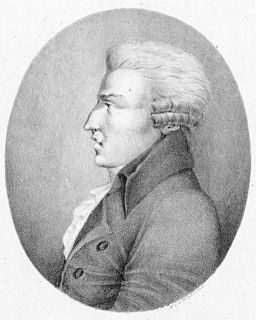Related Research Articles
Schenkerian analysis is a method of analyzing tonal music based on the theories of Heinrich Schenker (1868–1935). The goal is to demonstrate the organic coherence of the work by showing how it relates to an abstracted deep structure, the Ursatz. This primal structure is roughly the same for any tonal work, but a Schenkerian analysis shows how, in an individual case, that structure develops into a unique work at the "foreground", the level of the score itself. A key theoretical concept is "tonal space". The intervals between the notes of the tonic triad in the background form a tonal space that is filled with passing and neighbour tones, producing new triads and new tonal spaces that are open for further elaborations until the "surface" of the work is reached.

Francesco Durante was a Neapolitan composer.

Allen Forte was an American music theorist and musicologist. He was Battell Professor Emeritus of the Theory of Music at Yale University and specialized in 20th-century atonal music and music analysis.
Mannes School of Music is a music conservatory in The New School, a private research university in New York City. In the fall of 2015, Mannes moved from its previous location on Manhattan's Upper West Side to join the rest of the New School campus in Arnhold Hall at 55 W. 13th Street.

Tor Vergata University of Rome, also known as the University of Rome II, is a public research university located in Rome, Italy. Located in the southeastern suburb of Rome, the university combines a liberal arts tradition with emphasis on career orientation in the field of Economics, Engineering, Mathematics and Physics, Natural Sciences, and Medicine.

Jacopo Napoli was an Italian composer of the 20th century.
Unfigured bass, less commonly known as under-figured bass, is a kind of musical notation used during the Baroque music era in Western Classical music in which a basso continuo performer playing a chordal instrument improvises a chordal accompaniment from a notated bass line which lacks the guidance of figures indicating which harmonies should be played above the bass note. Figured bass parts have numbers or accidentals above the bass line which indicate which intervals above the bass should be played in the chord. However, not all basso continuo parts from the Baroque period were figured.

Nicola Sala was an Italian composer and music theorist. He was born in Tocco Caudio and died in Naples. He was chapel-master and professor at Naples, having devoted himself to the collection of the finest models of printed music.

Giacomo Antonio Francesco Paolo Michele Insanguine was an Italian composer, organist, and music educator. He was the last director of the conservatoire of Sant'Onofrio in Naples, which merged in 1795, two years after Insanguine's death in Naples, with the conservatoire of Santa Maria di Loreto. The most important and up-to-date critical study on him was recently published in an Anthology of unpublished eighteenth-century music in Puglia.

Elena Barbara Giuranna was an Italian pianist and composer.
Piero Niro is an Italian composer, classical pianist, and academic specialising in the philosophy of music and aesthetics.

A Partimento is a sketch, written out on a single staff, whose main purpose is to be a guide for the improvisation ("realization") of a composition at the keyboard. A Partimento differs from a basso continuo accompaniment in that it is a basis for a complete composition. Partimenti were central to the training of European musicians from the late 1600s until the early 1800s. They were developed in the Italian conservatories, especially at the music conservatories of Naples, and later at the Paris Conservatory, which emulated the Neapolitan conservatories.

Giorgio Nottoli is an Italian composer, musician and academic.
Robert O. Gjerdingen is a scholar of music theory and music perception, and is an emeritus professor at Northwestern University. His most influential work focuses on the application of ideas from cognitive science, especially theories about schemas, as an analytical tool in an attempted "archaeology" of style and composition methods in galant European music of the eighteenth century. Gjerdingen received his PhD from the University of Pennsylvania in 1984 after studying with Leonard B. Meyer and Eugene Narmour. His 2007 book Music in the Galant Style, an authoritative study on galant schemata, received the Wallace Berry award from the Society for Music Theory in 2009 and has become influential in the field of music theory. Gjerdingen was also editor of the journal Music Perception from 1998 to 2002.
Ernst Oster was a German pianist, musicologist, and music theorist. A specialist in the use of Schenkerian Analysis, he was the English translator of Heinrich Schenker's final work, Free Composition.
Peter van Tour is a Dutch musicologist, music historian and music theorist, specializing in Aural Training, Counterpoint and Historical Improvisation. He is best known as an expert in the field of Partimento and is the author of "Counterpoint and Partimento: Methods of Teaching Composition in Late Eighteenth-Century Naples", his doctoral dissertation. Van Tour is an associate professor of Music Theory and Musical Analysis at Örebro University in Sweden.
Ewald Demeyere is a Belgian harpsichordist, conductor and music theorist. He is known as an expert in partimento realization and counterpoint.
Vasili Byros is a Greek-American music theorist, musicologist and pianist. He is best known for his contributions to the field of music schemata theory and partimento.
Nicholas Baragwanath is a British music theorist, musicologist and pianist. He is currently Professor of Music at the University of Nottingham. He is best known for his contributions to the compositional theory and practice of 19th-century Italian Opera. He regularly writes and presents for BBC Radio 3.
Giuseppe Arena was an Italian composer and organist, best known for his operas.
References
- ↑ Universitá degli Studi Tor Vergata Didattica Web
- ↑ Faculty Page University of Rome-Tor Vergata
- ↑ Society of Music Theory Past Publication Awards, 2013